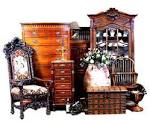Blog Archives
Before you talk to an estate appraiser . . .
 Before you talk to an estate appraiser, have as much of the following information as possible ready:
Before you talk to an estate appraiser, have as much of the following information as possible ready:
1. your reason for an appraisal. Do you want to sell the item? To insure the item? To donate the item? These require different types of appraisals and will usually produce different values.
2. any information you have about the item: its description, measurements, artist/craftsman, age, when and where purchased, and for how much. You probably won’t have all that information, but every bit helps.
3. a photograph of the item and any identifying marks.
Why are estate appraisers better than auctioneers? They are usually more knowledgeable about the value of objects, especially antique objects. Some appraisers are also auctioneers; other appraisers work with specific auctioneers.
Inherited Stuff? How an estate appraiser might help
 If you’ve inherited a house full of Stuff and you have no time to handle any of it yourself, you might consider using the services of an estate appraiser. Contact an estate appraiser before you’ve done any removals, and ask if they will meet you on site for a discussion of their fees and their recommendation. It will probably take an hour. They should not charge for this service, just like interviewing a lawyer about your case should not cost you. You are shopping for professional help and should interview at least two. After examining the house’s contents, the appraiser can tell you which of several options they recommend:
If you’ve inherited a house full of Stuff and you have no time to handle any of it yourself, you might consider using the services of an estate appraiser. Contact an estate appraiser before you’ve done any removals, and ask if they will meet you on site for a discussion of their fees and their recommendation. It will probably take an hour. They should not charge for this service, just like interviewing a lawyer about your case should not cost you. You are shopping for professional help and should interview at least two. After examining the house’s contents, the appraiser can tell you which of several options they recommend:
1. An estate sale on the site. If the location is convenient to lots of people and the estate includes some high quality Stuff worth a total of at least $10,000, this will probably be the way to go. Nice antiques, art, rugs, and handcrafts tend to sell better in the home than in a store.
 2. If there are just a few exceptional items, they could move those to an antique shop or art gallery and sell on consignment. This takes time—many things will not sell for months, maybe years, but if you’re in no hurry for the money, it could work best. A typical cut for the store would be around 40-50%.
2. If there are just a few exceptional items, they could move those to an antique shop or art gallery and sell on consignment. This takes time—many things will not sell for months, maybe years, but if you’re in no hurry for the money, it could work best. A typical cut for the store would be around 40-50%.
3. They might buy the contents of the house outright. Then you’re done with it. This means less money for you, but it’s over. Whew!!
4. Another option is an online estate auction where every item is tagged with a number and the house is open for a day or two for preview only. This is an inspection time where individuals and antiques dealers can breeze in, pen and paper in hand, and take note of any items they want to bid on. They go home, log onto the auctioneer’s website where every item is listed beside its picture, and bid for the things they want. After a few days, the top bidders are notified to pick up their property.
No one knows everything, and a good estate appraiser will have contacts with experts in many fields that she can call on for help when the estate contains Stuff like oriental rugs or antique silver or hand-carved decoys or leather-bound first editions. This ensures you get the most money for your Stuff. And since the appraiser is getting a percentage, it is to her advantage to get you the highest price.
Most auctions are “open” which means the items are going to be sold for whatever they bring. No “reserves.” A reserve is the floor below which the item will not sell. (As in, “I want to sell this table but not for less than $200.” In that case, $200 is the reserve.) In an estate sale, every single item is priced. Prices may be negotiable but not usually on the first day.
Rush Job
You’ve inherited a house full of Stuff. It’s far away. Your job can’t spare you for long and you’re looking after your elderly mother-in-law. What to do?
 Use an estate appraiser and auction off the bulk of the estate. Contact at least two estate appraisers (or estate liquidators or auctioneers) and have them come to the house to look over the estate and give you a quote on their services. These people can do a turnkey operation for you if you want it, although of course, you will pay for these services out of whatever proceeds result from the sale of the Stuff. They can pack, mail, or ship any items you want to keep, specifically those mentioned in the will. They can pick out the more valuable furnishings and take them away for sale at their next scheduled auction. Unless they have a special license, they may not be able to sell liquor and guns, but they will know who to contact for these. They can sort through the remainder, hauling the stacks of newspapers to the recycling center and the rolls of rusty chicken wire to the dump. They can sell boxes of kitchen tools and old books for a couple bucks or take them to Goodwill if you tell them that’s what you prefer. Or they can offer you a flat price, say $15,000 for the entire contents of the house, and what they auction off or throw out is left up to them. (And if you decide to contract with a nonprofit like Goodwill to dispose of the contents, you can use that quote of $15,000 as the credible value of the contents when you declare the donation on your income tax return.)
Use an estate appraiser and auction off the bulk of the estate. Contact at least two estate appraisers (or estate liquidators or auctioneers) and have them come to the house to look over the estate and give you a quote on their services. These people can do a turnkey operation for you if you want it, although of course, you will pay for these services out of whatever proceeds result from the sale of the Stuff. They can pack, mail, or ship any items you want to keep, specifically those mentioned in the will. They can pick out the more valuable furnishings and take them away for sale at their next scheduled auction. Unless they have a special license, they may not be able to sell liquor and guns, but they will know who to contact for these. They can sort through the remainder, hauling the stacks of newspapers to the recycling center and the rolls of rusty chicken wire to the dump. They can sell boxes of kitchen tools and old books for a couple bucks or take them to Goodwill if you tell them that’s what you prefer. Or they can offer you a flat price, say $15,000 for the entire contents of the house, and what they auction off or throw out is left up to them. (And if you decide to contract with a nonprofit like Goodwill to dispose of the contents, you can use that quote of $15,000 as the credible value of the contents when you declare the donation on your income tax return.)
This option is the least desirable in terms of money for the heirs, but it may be the most desirable for heirs who are too old, too ill, too far away, or too busy to handle any of the work themselves.